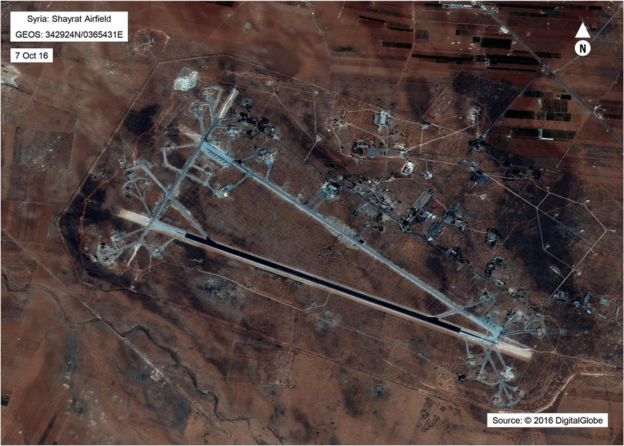The US has carried out a missile attack against an air base in Syria in response to a suspected chemical weapons attack on a rebel-held town.
Fifty-nine Tomahawk cruise missiles were fired from two US Navy ships in the Mediterranean, the Pentagon said.
President Donald Trump said they hit a base from which the Syrian government launched Tuesday’s chemical attack.
The Kremlin, which backs the Syria government, has condemned the US strike.
Dmitry Peskov, spokesman for Russian President Vladimir Putin, called it “an act of aggression against a sovereign nation”.
The attack, at 04:40 Syrian time (01:40 GMT), comes just days after dozens of civilians, including many children, died in the suspected nerve gas attack in the town of Khan Sheikhoun in Idlib province.
Speaking from his Mar-a-Lago estate in Florida, Mr Trump branded Syrian President Bashar al-Assad a “dictator” who had “launched a horrible chemical weapons attack on innocent civilians”.
Mr Trump said he had acted in America’s “vital national security interest” to prevent the use of chemical weapons.
“Tonight I call on all civilised nations to join us in seeking to end this slaughter and bloodshed in Syria and also to end terrorism of all kinds and all types,” he said.
The UK government called the US strike “an appropriate response to the barbaric chemical weapons attack”.
The Pentagon said the Russian military, which supports Syrian government forces, had been informed ahead of the US action.
In a statement it said missiles fired from Navy destroyers USS Porter and USS Ross had targeted aircraft, aircraft shelters, storage areas, ammunition supply bunkers, air defence systems, and radars at Shayrat airfield in western Homs province.
The Pentagon added that the strike was intended “to deter the regime from using chemical weapons again”.
It did not give details of damage or casualties but the governor of Homs province said there had been deaths and parts of the base were on fire.
“It will take some time to determine the extent of the damage,” Talal Barazi told AFP news agency.
However, the Syrian Observatory for Human Rights, a UK-based monitoring group, said at least four Syrian soldiers had been killed.
Analysis: Jon Sopel, BBC North America editor
Rarely has a policy changed so far and so quickly – and rarely has it been acted upon so swiftly.
When President Trump came to office the Syrian leader was seen as a useful ally in the fight against so-called Islamic State. All talk of regime change stopped.
But the chemical weapons attack changed all that. Within two days, the US has reversed its view on President Assad, identified targets and struck.
What we don’t know is whether this is a one-off act of retaliation, or the start of something more prolonged against the Assad government. Nor do we know where it leaves relations with Syria’s strong ally, Russia.
A White House spokesman said the site targeted by the cruise missiles “was directly linked to the horrific chemical weapons attack”.
“We assess with a high degree of confidence that the chemical weapons attack earlier this week was launched from this site by air assets under the command of the Assad regime,” the official said.
“We also assess, with a similar degree of confidence, that the Assad regime used a chemical nerve agent consistent with Sarin in these attacks.”
A statement on Syrian state TV said “American aggression” had targeted a Syrian military base with “a number of missiles” but gave no further details.
Syria ‘chemical attack’: What can forensics tell us?
The US has led a coalition carrying out air strikes against jihadist groups in Syria since 2014 but this is the first time it has targeted government forces.
The latest action was welcomed by Syrian opposition group the Syrian National Coalition.
“We hope for more strikes… that these are just the beginning,” spokesman Ahmad Ramadan told AFP news agency.
President Trump had earlier warned that “something should happen” against the Syrian leadership following the deaths in Khan Sheikhoun, but gave no details.
Also on Thursday, US Secretary of State Rex Tillerson signalled a sudden shift in policy by the Trump administration, saying that Bashar al-Assad should have no role in a future Syria.
Only last week the US ambassador to the UN, Nikki Haley, said Washington was no longer prioritising the removal of the Syrian president.
The UN Security Council will hold further talks on Friday as it tries to agree a resolution calling for an investigation into the deaths in Khan Sheikhoun.
Russia has already rejected a Western-backed draft. Moscow has used its veto seven times to block UN resolutions critical of its ally Syria.

BBC
 Q FM Africa's Modern Radio
Q FM Africa's Modern Radio